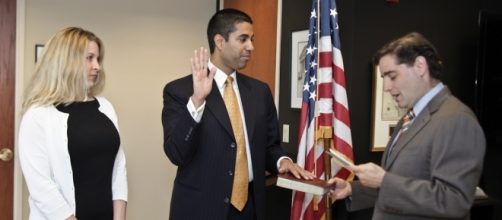With a speech that was interrupted by loud applause twice and concluded with a standing ovation, FCC chairman Ajit Pai had a room full of broadcasters ready to nominate him for sainthood barely 100 days into his term of office. He promised to revitalize AM radio, loosen TV station licensing rules, and take a weed whacker to 1000 pages of decades-old FCC regulations. For broadcasters under siege from the digital revolution and shrinking ad revenues, Pai’s words were like a massive dose of oxygen where the air had become very thin.
“The last thing broadcasting needs are outdated rules standing in their way,” said Pai, who spoke before a packed room last Tuesday at the NAB conference in Las Vegas, Nevada.
“This FCC will go where the facts and the law lead us.”
FCC plans to wield more power
But the devil is in the details and the technology industry has watched with a great deal of concern as Pai and other members of the FCC commission sent strong signals that they would seek to turn the commission’s approach in a wholly different direction as far as the digital revolution is concerned. In other words, this FCC is going to re-assert its significant regulatory power, potentially in favor of telecom giants. As fellow FCC commissioner Michael O’Rielly (a Republican) told broadcasters a day before Pai’s appearance, “It wasn’t until the Obama administration that the independence of the agency was essentially eviscerated.”
Under former FCC chairman Tom Wheeler, who was appointed by former President Obama, the commission passed the Open Internet Order in 2015, a set of rules designed to make Internet content equally accessible for all.
This is a doctrine more commonly known in the industry as “net neutrality.”
Pai has made it clear that he has zero interest in keeping that standard. Less than 24 hours after his standing ovation at NAB, the FCC chairman delivered a speech in Washington stating that the rules, which have prevented major broadband carriers such as AT&T, Comcast, and Verizon from deliberately favoring some content providers over others, needed to be substantially revised.
Google, Facebook and Netflix not pleased
The irony is that in promising to “modernize our media rules,” as Pai told the broadcasters in Las Vegas, he is risking a pullback on the very elements which have dramatically reshaped how, where, and when today’s consumers get their content.
This is already giving the technology industry a measure of heartburn. Two weeks ago, a lobbying group representing Google, Facebook and Netflix urged the FCC not to change the rules. And last week, 800 tech startups sent Pai a letter encouraging him not to dismantle net neutrality.
Nevertheless, Pai signaled in his speech last week that he intends to move fast. He announced that he would kick off the process to rollback net neutrality at the FCC’s next open meeting on May 18.
If the tech industry really wants to slow down the freight train, they had better get moving. Just this past month, the commission quietly approved a plan that allows AT&T and others to raise fees for small businesses, hospitals and libraries who connect to the big carriers’ main arteries.
In this FCC, the free market will be king.
A day before Pai spoke to the broadcasters at the NAB Show last week, the conference featured a panel discussion (that included former FCC commissioner Robert McDowell) which was titled “Should The FCC Be Abolished?” One day later, the agency’s chairman was getting a standing ovation. Perhaps a greater measure of the FCC’s ultimate impact will be whether he gets the same reception one year from now.


